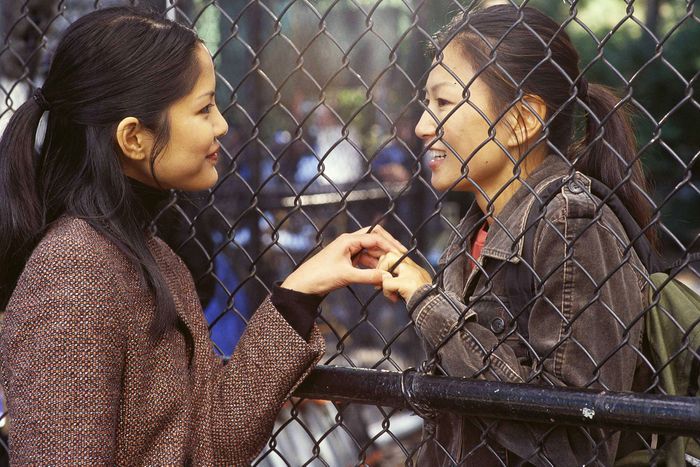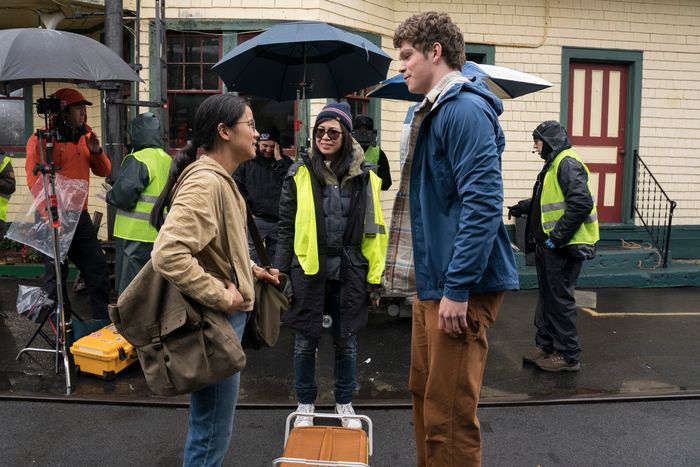
This article was featured in One Great Story, New YorkÔÇÖs reading recommendation newsletter. Sign up here to get it nightly.
ThereÔÇÖs a scene in Alice WuÔÇÖs Saving Face in which Joan Chen, playing Ma, wanders into a Brooklyn video store in search of Mandarin-language fare. The film premiered in 2004, when rentals were thriving, but the establishment Ma finds herself in is on the seedier side, and thereÔÇÖs something particularly desultory about the section sheÔÇÖs pointed toward. ThereÔÇÖs a copy of wuxia hit Crouching Tiger, Hidden Dragon, Bernardo BertolucciÔÇÖs The Last Emperor (a nod to ChenÔÇÖs own filmography), and The Joy Luck Club ÔÇö a whole country and its U.S. diaspora represented by a scattering of titles, one of them directed by an Italian and all of them shelved next to an Asian porn selection that looks a lot more robust. ItÔÇÖs a wry summary of the territory ÔÇ£ChinaÔÇØ occupies in the mainstream American cultural imagination ÔÇö but then WuÔÇÖs film adds a twist to the joke. Ma, whoÔÇÖs been living in the immigrant enclave of Flushing and watches imported soaps all day, is unbothered by yearnings for representation onscreen. ItÔÇÖs the porn that attracts her abashed attention, as a 48-year-old widow whoÔÇÖs never had the liberty to watch something like that before.
Saving Face, which played at the Toronto International Film Festival and Sundance before it opened in theaters in 2005, was the first film from director Alice Wu, who was 35 at the time, having left a career at Microsoft in order to bring her debut project into the world. And for a while ÔÇö until The Half of It, a Gen-Z take on Cyrano de Bergerac, arrives on Netflix on May 1 ÔÇö it was her only film, a feature whose existence continues to feel unicorn-improbable a decade and a half on. ItÔÇÖs a film about Wil (Michelle Krusiec), a semi-closeted surgical resident whose romantic life becomes increasingly complicated when her mother (Chen) moves in with her, pregnant with a baby whose father she wonÔÇÖt name. There arenÔÇÖt exactly an abundance of Chinese-American lesbian rom-coms in existence, especially ones that happened to have been produced by Will Smith (courtesy of his Overbrook Entertainment partner, Teddy Zee) with aspirations of chasing the success of My Big Fat Greek Wedding. The scene at the video store feels like an acknowledgment of that fact ÔÇö as well as a playful shrug at the impossibility of pleasing everyone who hopes to see some part of their experiences onscreen.
Needless to say, Saving Face did not make My Big Fat Greek Wedding money, maybe because itÔÇÖs not interested in serving up cultural differences to be laughed at rather than with; thereÔÇÖs no outsider character serving as an audience surrogate. When Wil falls in love, itÔÇÖs with a childhood friend turned ballet dancer named Vivian Shing (Lynn Chen) ÔÇö someone who understands the two worlds Wil straddles. And while the film stays gently comedic throughout, it deals with heavy themes like filial obligations and disownment ÔÇö the reasons that Ma turns up on WilÔÇÖs doorstep, and the reasons that Wil doesnÔÇÖt discuss her love life with Ma. ThereÔÇÖs something about its steadfast ebullience, the insistence that a happy ending is as authentic as pain, that feels better suited to audience appetites today than it did to arthouse tastes at the time.
Saving Face wasnÔÇÖt a hit, but it performed well enough at the box office and with critics for studios to offer Wu new projects. Speaking over Zoom from her home in San Francisco this month, she recalled the aftermath of her debut. ÔÇ£I was like a deer in headlights. People were like, ÔÇÿWhatÔÇÖs next?ÔÇÖ And I was like, ÔÇÿI donÔÇÖt know. I just was thinking I was going to get this thing made.ÔÇÖÔÇØ She was attached for a while to an adaptation of a memoir called Foreign Babes in Beijing for Paramount, and then she sold a pilot to ABC that was inspired by her experiences working in the tech industry. But the sense of urgency that had led her to make her initial leap of faith from that world, writing a screenplay and moving to New York to learn filmmaking, just wasnÔÇÖt there anymore. ÔÇ£I was reacting to the market,ÔÇØ she said. ÔÇ£I was picking things that I was interested in, but it was work for hire. It was still enjoyable in a lot of ways, but thereÔÇÖs a difference between something thatÔÇÖs yours and something that youÔÇÖve been hired to do.ÔÇØ
Wu is 50 now, though anyone would peg her at a good decade or two younger, and sheÔÇÖs a discursively delightful person to talk with, prone to chasing different trains of thought and refusing to place herself at the center of the conversation. But that same sense that she doesnÔÇÖt have to be the one speaking if she doesnÔÇÖt have something pressing to say also amounts to why she ended up leaving Hollywood ten years ago. When Wu got her start as a filmmaker, articles about her stressed a certain pragmatism ÔÇö the way she left a lucrative software gig in Seattle and gave herself a five-year window in which to make a go of filmmaking ÔÇö in a way that underplayed the sheer tenacity required to push through a project that every executive reflexively wanted to make more white and less gay. The process reinforced what Wu perceived to be true in college, that ÔÇ£being a writer conjures up a white guy in Paris smoking a thin cigarette and drinking a tiny coffee,ÔÇØ and that ÔÇ£being a filmmaker conjures up another white guy who commands respect in this patriarchal, square-jawed way. None of these things are me.ÔÇØ
After Saving Face, the idea of making compromises on behalf of something she was less personally invested in, just to direct again, wasnÔÇÖt that appealing. ÔÇ£It turns out IÔÇÖm just very stubborn,ÔÇØ she said. ÔÇ£IÔÇÖm just not going to be like, ÔÇÿYeah, IÔÇÖll make these changes for a financier.ÔÇÖÔÇØ
Then when WuÔÇÖs mother, for whom she wrote her first film (ÔÇ£I wanted my mother to know that it was never too late to fall in love for the first time,ÔÇØ she wrote in her directorÔÇÖs statement) had a major health issue around 2009, Wu went up to the Bay Area to take care of her for what she initially thought was going to be a few weeks. Around the eight-month mark, when her agent called and asked if she was coming back to Los Angeles, she admitted she wasnÔÇÖt. To herself, she admitted more than that. ÔÇ£I didnÔÇÖt say this to her, but in my head I was like, ÔÇÿIÔÇÖve left the industry.ÔÇÖÔÇØ Wu took care of her mom, taught long-form improv, and lived thriftily off the investments and the savings sheÔÇÖd put together from her two careers.
A decade passed, the movie business ebbed and flowed and started to seriously contend with its own assumptions about what a writer and a filmmaker looks like ÔÇö and suddenly Wu found the industry sheÔÇÖd walked away from newly interested in her. ÔÇ£IÔÇÖm like a weird forest animal thatÔÇÖs in some part of the forest that no one ever goes to,ÔÇØ she joked. ÔÇ£Then one day, for reasons I donÔÇÖt understand, someone went off the path. I come out of my hole, and there are all these random people around. TheyÔÇÖre like, ÔÇÿHey, so exciting.ÔÇÖ Literally, someone was like, ÔÇÿYou know, what we need is an Asian lesbian. ThereÔÇÖs one!ÔÇÖÔÇØ Now The Half of It, a teen drama that just won the Best Narrative Feature award at the curtailed Tribeca Film Festival, feels destined to break a million quarantine-weary hearts when it hits streaming.
The Half of It owes its existence to Donald Trump. After the presidential election, Alice Wu found herself unable to focus on the spec script sheÔÇÖd been hired to write for someone elseÔÇÖs project, or to do anything except doom-scroll through the news. She started to wonder if what she needed to do was finally work on something of her own again, so she figured out a way to blackmail herself into finishing a first draft of a film that she could direct. She made out a check for $1,000 to the NRA, and placed it in the care of a friend who was under strict instruction to mail it off if Wu didnÔÇÖt meet her deadline. The threat of actually becoming a donor to the organization turned out to be an incredibly effective motivator.
TrumpÔÇÖs also the reason that The Half of It takes place in a small town called Squahamish instead of, say, a suburb in Orange County or New Jersey, and the reason Wu took the story to Netflix, the distributor that could promise the widest reach. Wu, a child of Taiwanese parents who grew up bouncing around the Bay Area, wanted to explore the experience of being the only immigrant kid in an insular area, as well as ÔÇö as far as her heroine, Ellie Chu (Leah Lewis), can tell ÔÇö the only queer one. But she also wanted to make a film that offered empathy toward people raised on beliefs they might grow out of, because she did. ÔÇ£I grew up in a very conservative Chinese family,ÔÇØ Wu said. ÔÇ£They were young immigrants in a very unfriendly country to them ÔÇö but my parents were totally sexist and racist and homophobic, and so was I.ÔÇØ When Ellie arrives at a house party where everyone cheers that ÔÇ£the Chinese girl came!,ÔÇØ they donÔÇÖt intend it to sting the way that it nevertheless does.
EllieÔÇÖs life is a series of slights, only some of them actually meant to wound, but the film takes care to emphasize how much time and space its characters have to change. Not that thatÔÇÖs much comfort to someone whoÔÇÖs socially invisible outside of the dubious honor of being the only Asian in school, a piano-playing, straight-A student who takes care of her depressive single dad (Collin Chou) and helps with the household bills by selling essays to classmates for $20 a pop. That side hustle is why a second-string football player named Paul Munsky (Daniel Diemer) comes to her for help punching up his woefully inept letters to school beauty Aster Flores (Alexxis Lemire). Ellie happens to also like Aster, as much as sheÔÇÖs allowed herself to think about things like that, and ends up channeling all her frustrated longing and wit into wooing her on PaulÔÇÖs behalf, first via notes, and then over text.
ItÔÇÖs a love triangle set-up that also brings to mind something Wu mentioned about the periods immediately following Saving Face. At that time, her agent urged her to prove that she could write a broad range of characters, by which he meant: straight and white. ÔÇ£Obviously, I can write those characters,ÔÇØ she recalls thinking. ÔÇ£I literally live among those characters all the time.ÔÇØ EllieÔÇÖs been doing the same, and it never occurs to her that she could be the romantic lead among them. Instead, she reflexively puts her words and thoughts in the mouth of Paul, whoÔÇÖs sweet if not especially smart, and who looks like the kind of person who traditionally gets the girl. She scripts herself out of the narrative, something the industry has so often asked Asian and Asian-American creators to do.
When Crazy Rich Asians came out in 2018, it was touted as the first studio film to feature a majority Asian cast since The Joy Luck Club in 1993. ThatÔÇÖs also, with slightly tweaked wording, one of the ways Saving Face was described in 2005, to give a sense of how slowly ground is gained when it comes to Asian-American cinema. These years-long gaps between breakthroughs can make it seem like history has to be continually remade. ÔÇ£ItÔÇÖs true that each subsequent generation of Asian-American filmmakers feels like they have to start over, that theyÔÇÖre the first,ÔÇØ said Andrew Ahn, whose new film, Driveways, will be released on May 7. He pointed out that before Saving Face, there was Ang LeeÔÇÖs gay 1993 green-card farce The Wedding Banquet, which was a hit. But he also notes that when he was trying to make his 2016 directorial debut Spa Night, a portrait of a queer Korean-American teenager, he was told it would be impossible unless he could get it done for a budget of under half a million dollars.
WeÔÇÖre currently experiencing a big moment for Asian-American film, if one whose successes have skewed heavily toward the East Asian and, within that, the Chinese-American ÔÇö what with Jon M. ChuÔÇÖs hit, the arthouse dominance of Lulu WangÔÇÖs The Farewell, the documentary awards racked up by Bing LiuÔÇÖs Minding the Gap, and Cathy Yan and Chlo├® Zhao helming superhero sagas. But when talking recently to Leah Lewis, the star of The Half of It, along with Michelle Krusiec and Lynn Chen from Saving Face, what comes up is both a feeling of greater opportunity and uncertainty with regard to whether it will last. ItÔÇÖs part of the reason Saving Face has become a kind of nexus point of Chinese-American women filmmakers.
Joan Chen, who can be seen in Alan YangÔÇÖs recent Netflix movie Tigertail, has directed two features since. Krusiec, who came to the realization that ÔÇ£you canÔÇÖt really wait for somebody to write for you,ÔÇØ got a spot in the AFI Directing Workshop for Women and was preparing, before the world was put on hold, to direct her first short. For Lynn Chen, Saving Face was a wonderful but unrepresentative introduction to acting in feature films. ÔÇ£I went into it naively thinking that lots of feature film directors are Asian women. It was a rude awakening, right after that, the real world of independent film.ÔÇØ It eventually led her to make her own directorial debut, a black-and-white indie called I Will Make You Mine that comes out on demand on May 26.
Tangled up in this discussion is something even more complicated, and tied back to that sparsely populated shelf in Saving Face and the idea that one film could meet the many expectations of a population so underserved. ItÔÇÖs something Wu is aware of, especially in the ramp-up to The Half of It. ÔÇ£Someone literally wrote, ÔÇÿI trust Alice Wu to give all of the gays everything they want,ÔÇÖÔÇØ she said. ÔÇ£IÔÇÖm just like, ÔÇÿOh my God, I can barely figure out how to give one gay some of what they want, let alone all gays everything they want.ÔÇÖÔÇØ Ironically, when Saving Face came out, you could get a sense from reviews that its feel-good touches were held against it. ÔÇ£Everything that happens in the last half-hour betrays the canny, hardheaded perspective of what came before,ÔÇØ Stephen Holden wrote in the New York Times.
That finale, in which Wil and Vivian are reunited with the help of their parents, cemented the filmÔÇÖs place in LGBTQ canon as the rare happy ending. But it also got Wu challenged at festivals about acceptance as something implausible. ÔÇ£Growing up queer ÔÇö especially when youÔÇÖre not out to yourself for so long ÔÇö the arc of love can feel tragic,ÔÇØ she said. ÔÇ£If, any time you have a crush, you immediately think, this is deeply shameful, I canÔÇÖt tell anyone or IÔÇÖll probably get killed, obviously thereÔÇÖs no happy ending. The best that will happen is you somehow survive.ÔÇØ But she doesnÔÇÖt find Saving FaceÔÇÖs last sequence ÔÇö which, incidentally, prompts other characters in the background to walk out of the scene in disgust ÔÇö unrealistic.
ÔÇ£Honestly, I believe those characters could get there,ÔÇØ Wu said. ÔÇ£Do I think everyone has that? Clearly not, but I never get to see that, and if I canÔÇÖt even see it, how can I believe it can happen for me?ÔÇØ
WhatÔÇÖs more amazing to Wu is that, 15 years later, no one seems to feel the same way about the ending, which, she observed, ÔÇ£means the world changed.ÔÇØ ItÔÇÖs changed just in time for her to make a movie thatÔÇÖs ultimately hopeful, but considerably more melancholy. Fifteen years later, The Half of It makes for an appropriate bookend with Saving Face ÔÇö another story about a young woman taking care of her single parent and showing off a capacity for self-sacrifice thatÔÇÖs also become a protective response, a way of putting herself last before anyone else can do that for her. It isnÔÇÖt a love story, which is something that Ellie herself warns viewers about in a voiceover early on ÔÇö not the kind ÔÇ£where anyone gets what they want.ÔÇØ But it is a story of a girl learning to love herself a little bit, to see the worth the film so easily finds in her. Ellie wasnÔÇÖt meant to be filed away on a shelf like the movies in Saving Face ÔÇö an exhibit of coming-of-age, of coming out, of ÔÇ£the Chinese girl.ÔÇØ SheÔÇÖs just someone who finds herself at the center of the screen, and holds it perfectly well.




